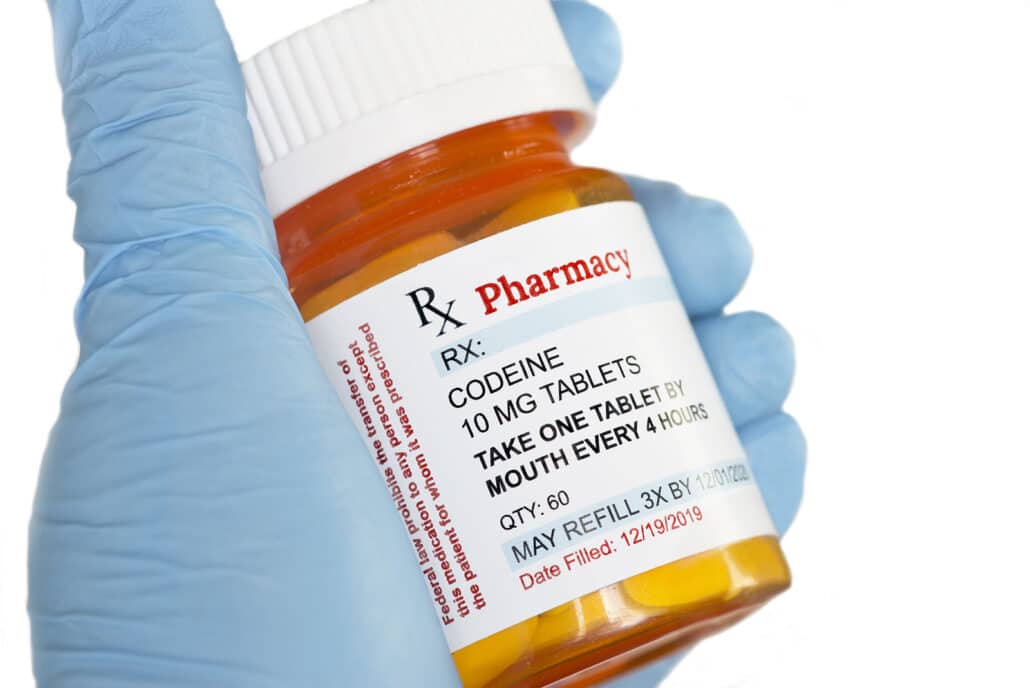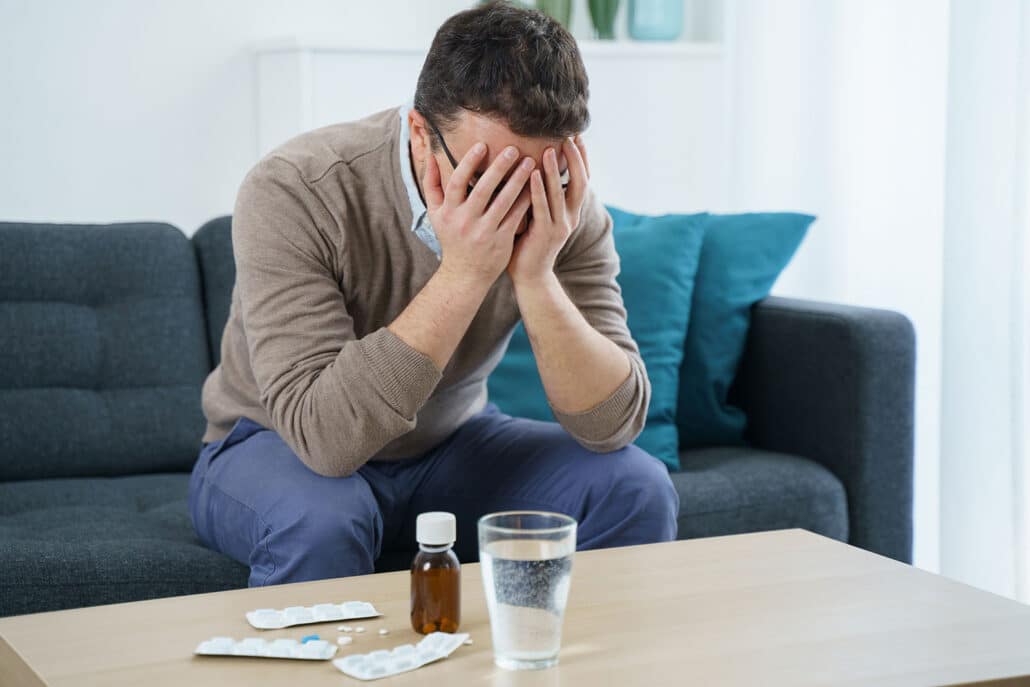Codeine is a part of the opioid family. It is commonly prescribed to treat common colds that bring coughs. However, it has pain-relieving properties as well. Therefore, it may be used to treat the discomfort that follows surgical procedures. Even though it is classified as a weak opioid, the risk of becoming addicted is quite high. This drug can do tremendous damage to the body and may lead to a fatal overdose. To overcome a problem, it is essential to seek professional help. At Long Island Interventions, we have the resources to provide the essential tools that help individuals maintain sobriety into the future.

Table of Contents
What is Codeine?
Originally, this drug was created to treat pain. It is a derivative of the opium poppy plant. When it is mixed with other drugs, including muscle relaxants and similar medications, it puts a person at high risk for suffocation or respiratory arrest. Although codeine is regulated in the United States, people still manage to abuse it. In fact, many teenagers are mixing it with soda, candy, and Tylenol in order to get a buzz. Since this drug is widely prescribed, there is a misconception that it is harmless. However, it is possible to use high doses that can severely slow a person’s breathing, which may be deadly. It is certainly a big part of the county’s opioid crisis.
How Codeine Affects the Body
To repeat, this medication is part of the opioid family. Therefore, it suppresses a person’s nerve endings in order to control pain. It affects other parts of the body as well. Certain users report feelings of nausea, constipation, and tingling sensations. In severe cases, this drug can cause problems with an individual’s heart rate, breathing, and blood pressure. Fatal consequences may result. It is advised that people who take this medication abstain from driving or operating heavy machinery. Impaired thinking and reaction time is likely.
Who Abuses Codeine Most Frequently?
Since this drug is prescribed for a number of ailments, anyone has a chance of becoming addicted. However, it has been shown that younger individuals are much more likely to use this medication for recreational purposes. It is used to achieve a euphoric high. However, it is easy for a person to build a tolerance. This means that it takes more of the substance to provide the same effects. This is the reason why this drug is so addictive. In certain cases, people mix the drug with other depressants like alcohol. This can lead to dire effects.
Even when a person has a prescription for the drug, it is possible for him or her to become hooked, especially when it is used to control pain. Due to its addictive nature, it becomes difficult to get through the day without the substance. This increases cravings and begins a misuse disorder.

Signs of a Codeine Addiction
There are certain signs that indicate an addiction to this drug.
- Anxiety
- Depression
- Dizziness
- Poor appetite
- Weight loss
- Clammy body
- Constipation/nausea
- Slow breathing
- Serious digestion issues
Additional Long-Term Problems
According to the National Institute on Drug Abuse, millions of Americans become addicted to prescription painkillers each year. This has become a major crisis for the country.
Over prolonged periods of use, abuse can lead to a higher likelihood of developing liver infections, permanent bowel damage, sleep problems, brain damage, and an irregular heartbeat. As with any addiction, a person craves the drug and allows relationships to suffer. A person’s entire life becomes disrupted.
- Liver/Kidney damage
- Hallucinations
- Uncontrolled shakes
- Night sweats
- Muscle spasms
- Respiratory arrest
- Slow heart rate
Withdrawal from this Drug
When a person tries to stop taking this drug, he or she begins the process of withdrawal. This period can be quite challenging. It brings a number of symptoms.
- Irritability
- Insomnia
- Sweating
- Runny nose
- Muscle aches
- Rapid heartbeat
- Nausea/Vomiting
- Dilated pupils
- Stomach issues
- Chills

Treating Withdrawal Symptoms
Although some people decide to quit cold turkey and give up without help, this can be very dangerous. It is best to taper off the drugs so that the body can adjust. It is wise to seek professional assistance throughout the detox process. When a person begins feeling the effects of withdrawal, he or she may give up and begin using again. However, this is the point when an overdose is most likely. At Long Island Interventions, we have doctors who use medications during this period so that symptoms are less dangerous and bothersome. It is vital to note that these drugs are only used on a temporary basis. Patients are constantly monitored so that relapse does not occur. When the drug is out of a person’s system, true treatment can begin.
Further Addiction Treatment
Detox is just the first step in the recovery process. Indeed, further treatment is necessary.
- Inpatient Treatment. The most intensive treatment involves living in a facility with 24/7 care. Medical professionals monitor patients who receive all types of therapies, including individual sessions and group counseling. Facing problems alone and with support are key building blocks of recovery.
- Outpatient Treatment. When a person has outside obligations and cannot reside in a facility, outpatient treatment is a smart option. Patients still receive therapy that gets to the root of the problem so that long-term sobriety is possible. A person attends sessions throughout the day and returns home at night.
In both instances, patients are taught healthy coping mechanisms so that they do not use drugs as crutches. When people have alternatives to drugs, it is possible to return to the world and live without foreign substances.
Staging an Intervention
An effective way to push someone in the direction of help for an addiction is to stage an intervention. Many times, friends and family recognize a problem that the user does not acknowledge. The purpose of an intervention is to bring attention to the problem before terrible consequences occur. At Long Island Interventions, we can provide help with the organization of a successful intervention. It is important to get a person ready to accept that help is needed. By working with a specialist, a person with a misuse disorder receives necessary guidance through the recovery process. Following up with a proven treatment plan is essential as well.
Working with Long Island Interventions
If you or a loved one is suffering from an addiction to codeine, help is available. At Long Island Interventions, we offer New Yorkers a wide variety of resources to begin their recovery. We can help people successfully overcome their opioid addictions. We understand that even when the drug is taken by prescription, it can lead to a misuse disorder. Things get even more complicated when mental illnesses are part of the puzzle. Our staff is trained to treat co-occurring disorders as well. Besides conventional therapies, we offer holistic treatment that target the body, mind, and spirit. In the end, our goal is to help individuals enjoy sobriety in the long term. For more information, contact us today.

